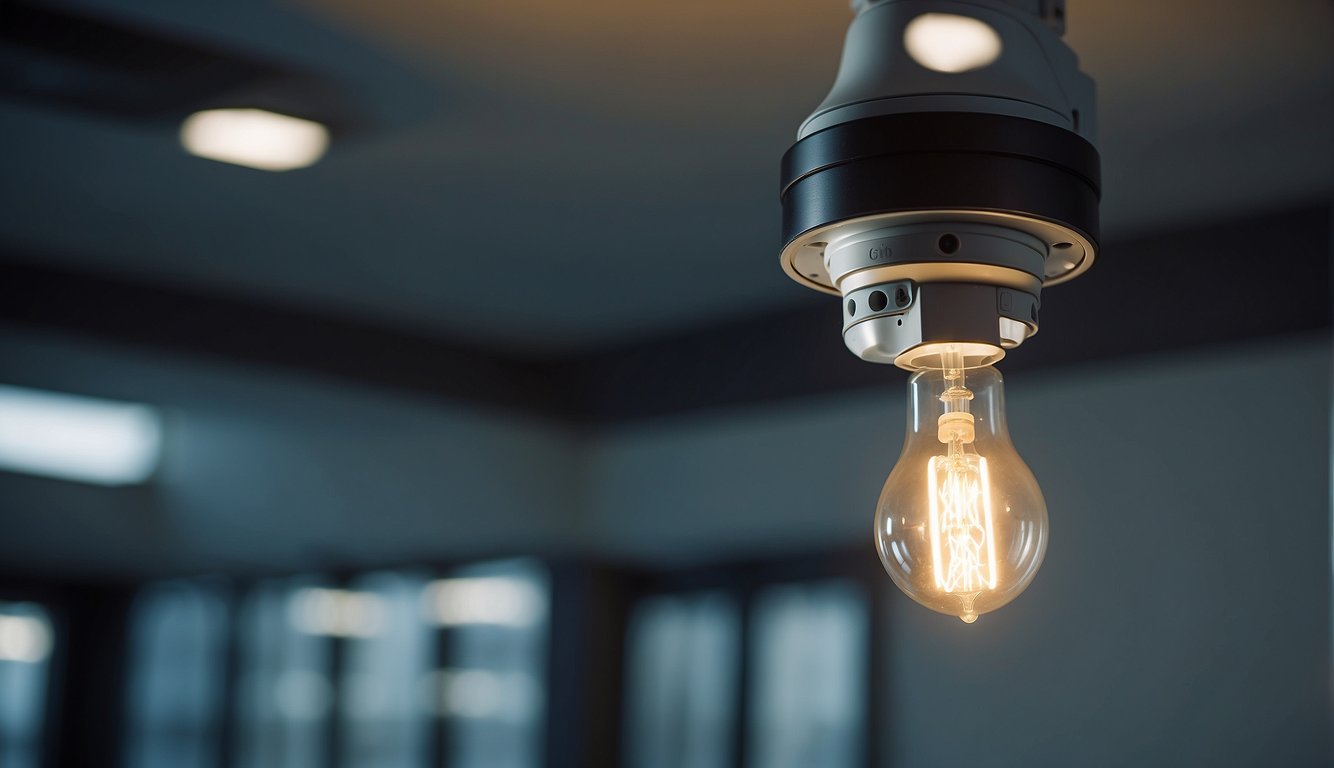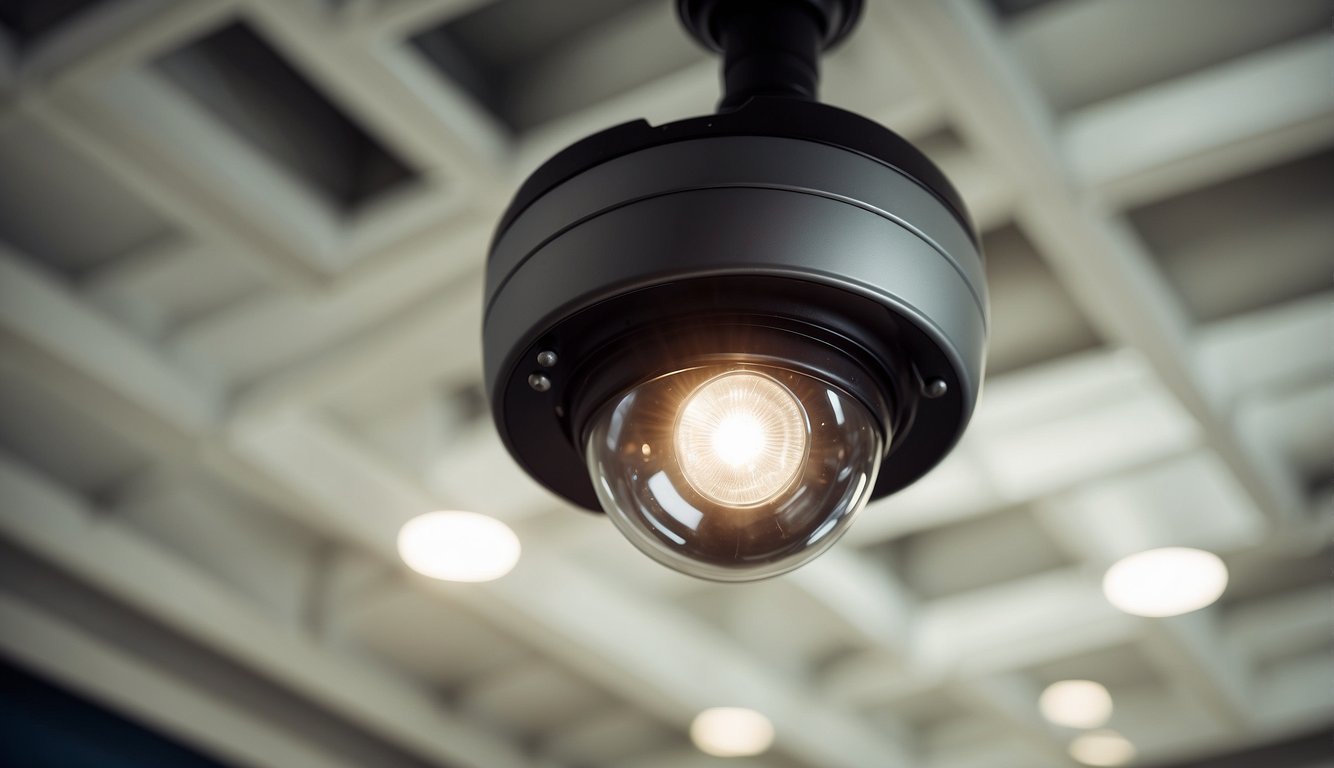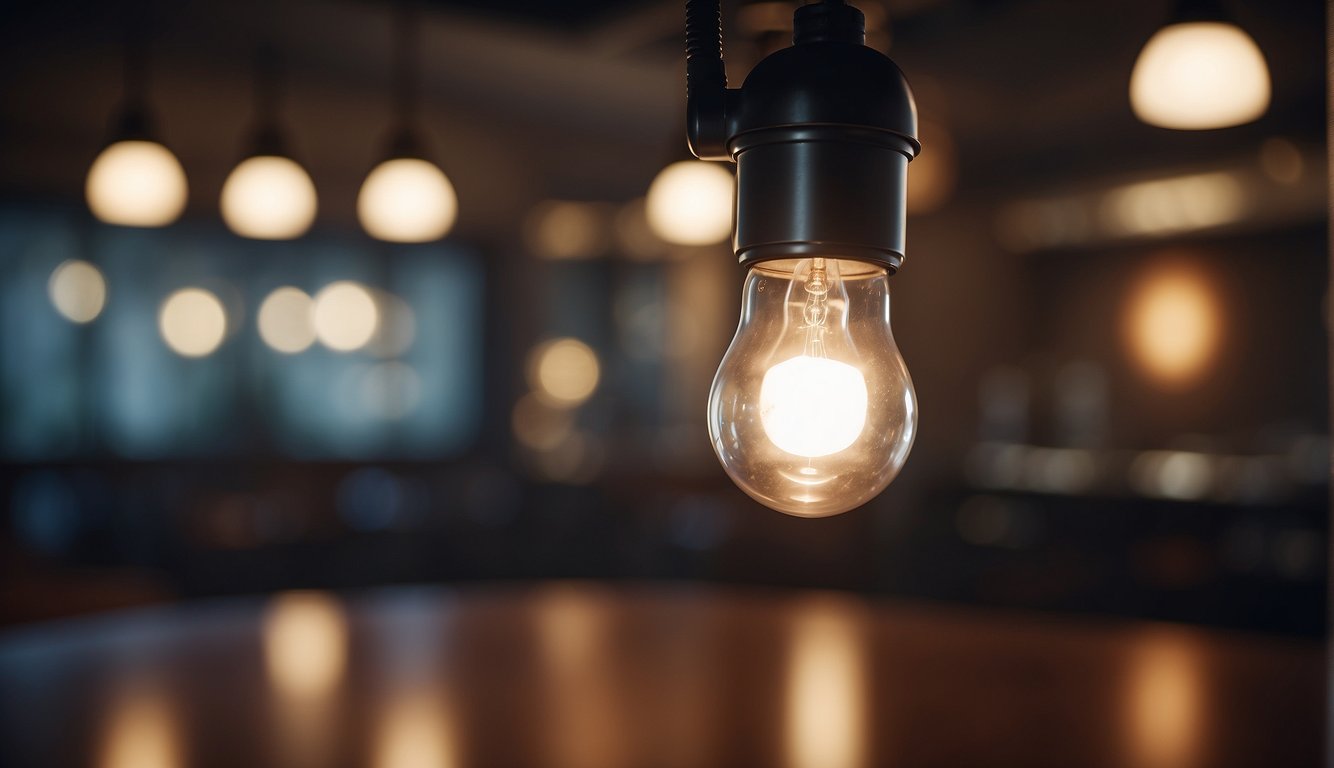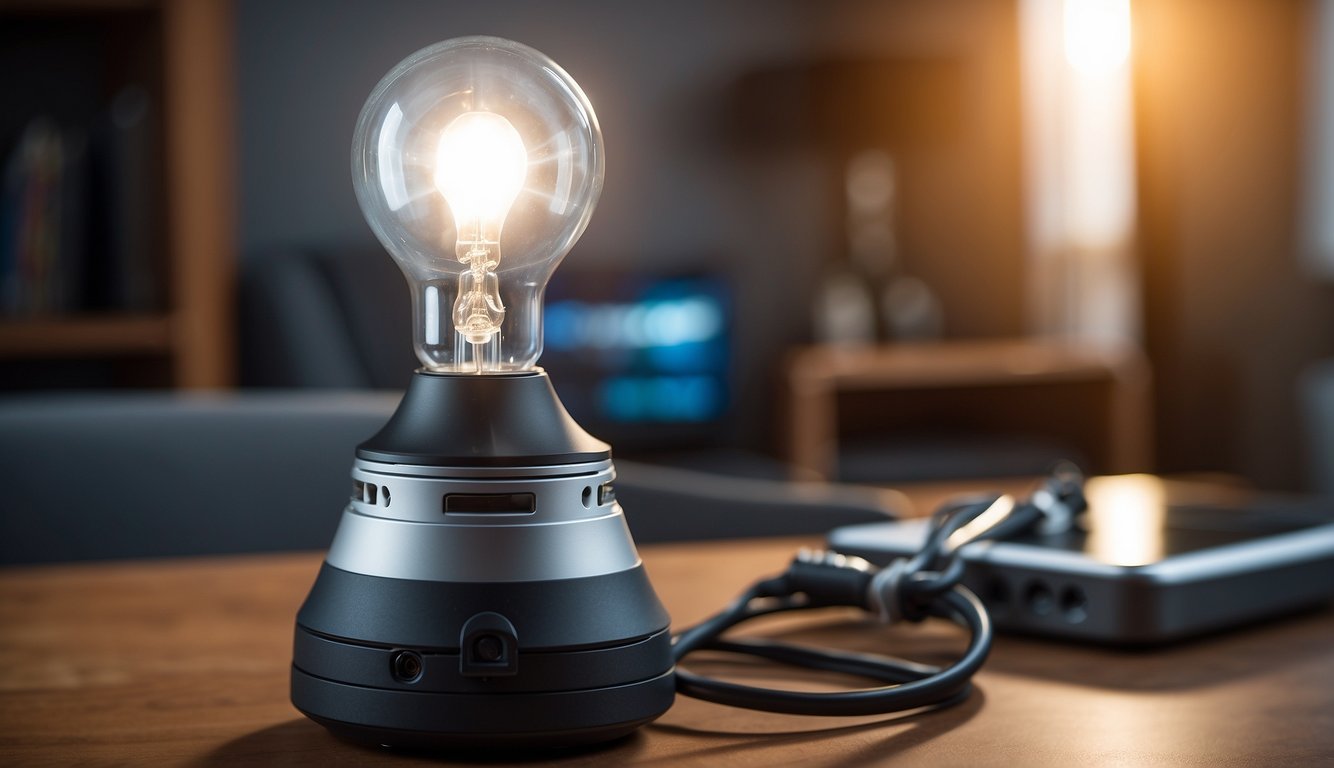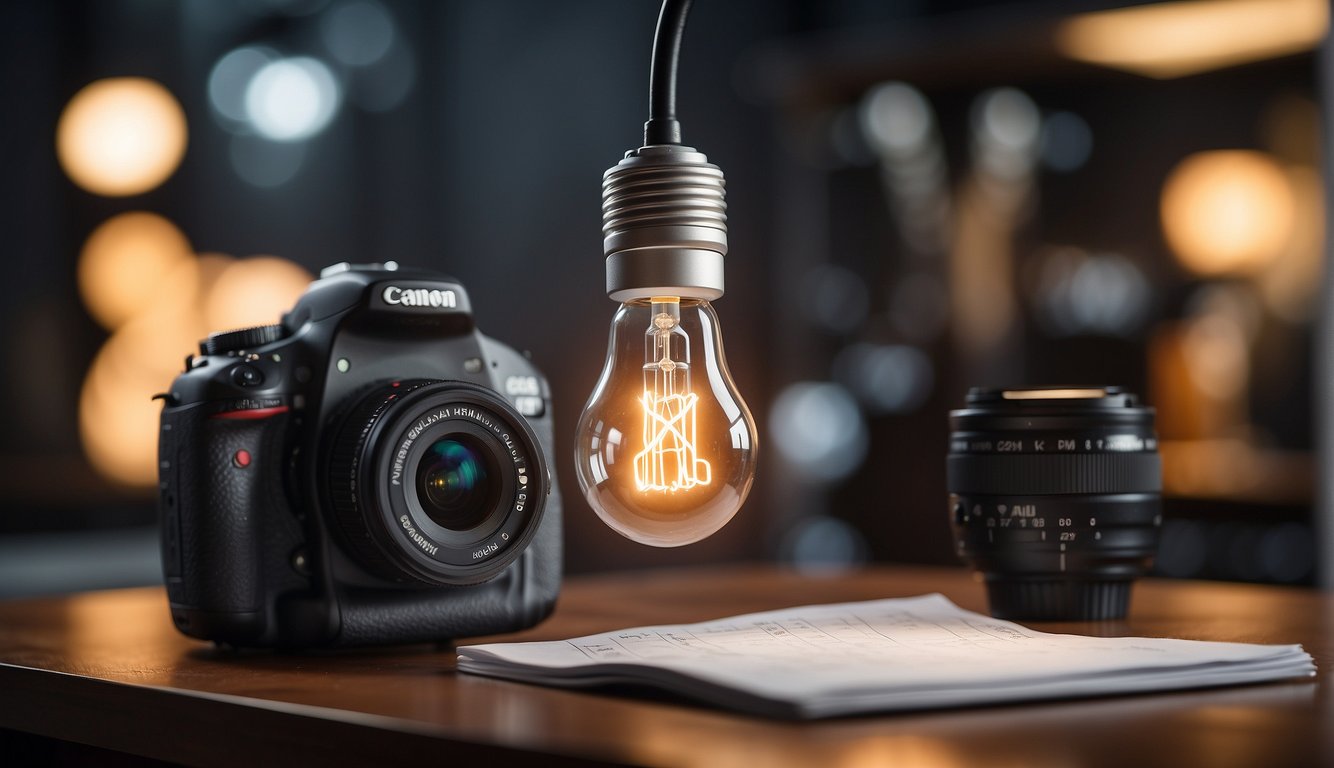In the realm of home security, light bulb cameras emerge as an innovative blending of illumination and surveillance. Unlike traditional security systems, these devices allow you to monitor your home discreetly through a familiar household item—the light bulb. Their design is intended to provide you with security footage while maintaining the appearance of a standard light fitting, which can be particularly advantageous if you prefer non-obtrusive security solutions.
However, the suitability of light bulb cameras for your home depends on multiple factors. They offer convenience and ease of installation, functioning within existing light sockets without the need for complicated wiring. On the other hand, the position of light fixtures in your home, which may not always coincide with ideal surveillance points, is a consideration that could influence camera effectiveness. Moreover, features such as the resolution, field of view, and smart home integration capabilities are essential when assessing their applicability to your security needs.
Key Takeaways
- Light bulb cameras combine security surveillance with household lighting.
- They provide easy installation but must be placed strategically for effectiveness.
- Essential features include resolution, field of view, and smart home compatibility.
Understanding Light Bulb Cameras

Light bulb cameras are a unique blend of functionality and stealth. They combine the practicality of lighting up your space with the advanced features of modern security devices. Imagine a device that lights up your room and also keeps a watchful eye for your safety—that’s what a light bulb camera does.
Typically, a light bulb camera installs just like any regular bulb. You screw it into your standard light socket, and voilà, you’ve got yourself a surveillance system. But here’s what makes them special:
- HD video recording: These cameras provide high-definition video, ensuring that the footage captured is clear and useful.
- Motion detection alerts: You’ll get notified on your smartphone if any movement is caught, a proactive way to stay on top of your home security.
- Night vision: Your camera doesn’t sleep when you do; it can see even in the dark, providing round-the-clock surveillance.
- Remote viewing: Watch live feeds from your phone no matter where you are, giving you peace of mind at all times.
There are numerous benefits to integrating light bulb cameras into your home security strategy. These cameras can offer a wide field of view, up to 360 degrees in some cases, allowing for a comprehensive view of a room from a single vantage point. Additionally, the installation of these devices is generally more straightforward than traditional security cameras, as they don’t require separate wiring or complicated setup processes.
Yet, bear in mind that light bulb cameras may have limitations as well. For example, the field of view could be narrower when compared to conventional security cameras, potentially affecting the amount of area you’re able to monitor. Light quality may also vary since the primary function is security rather than illumination.
But in essence, if you’re looking for an easy-to-install and discreet security option, light bulb cameras could be an excellent choice for keeping an eye on things without standing out.
Pros of Light Bulb Cameras
Light bulb cameras offer you a clever way to safeguard your home without the complexity and high costs often associated with traditional security systems. Let’s explore how these innovative devices can provide you with peace of mind.
Discreet Monitoring
Discreetness is a standout benefit. With a design that mimics an ordinary light bulb, light bulb security cameras blend into your home’s environment, making it difficult for intruders to spot them. They allow you to keep an eye on your space without installing obvious surveillance equipment.
Ease of Installation
The installation process is simple and straightforward, saving you time and possibly avoiding the need for professional help. You can screw them into a standard light socket and connect them to your home Wi-Fi. You’ll appreciate the ease of setting them up, often completed within minutes.
Cost-Effective Security Solution
When it comes to home security, affordability is key. Light bulb cameras are a cost-effective option. They provide a significant security advantage over traditional cameras without breaking the bank. Considering the price compared to full security systems, light bulb cameras offer a budget-friendly alternative without sacrificing functionality.
Cons of Light Bulb Cameras
While light bulb cameras offer the convenience of surveillance in a discrete device, you may encounter some downsides worth considering. These include potential privacy issues, limitations in their functionality, and reliance on a continuous power supply.
https://www.youtube.com/watch?v=Nff8LJxeJks&embed=true
Privacy Concerns
Your concern for security might create privacy challenges. Understandably, light bulb cameras are hard to detect, which raises issues about invasive monitoring. If you’re using these cameras, it’s crucial to ensure that they do not encroach on the privacy of neighbors or passersby.
Limited Functionality
« Reasons Light Bulbs Explode: Understanding the Causes
Types of Light Bulbs with 2 Prongs: Finding Your Perfect Match »
Despite being a nifty gadget, light bulb cameras often come with a limited field of view, restricting their ability to monitor large areas. By nature, their scope is confined to where the light socket points, which might not always align with your surveillance requirements.
Dependence on Power Source
Remember that light bulb cameras are dependent on a power source. If the light fixture’s switch is off or if there is a power outage, your camera will not function. This reliance means that you may not have surveillance at all times, particularly during power interruptions.
Key Features to Consider
When you’re in the market for a light bulb camera, prioritizing certain features will ensure that your home security setup meets your expectations. High-resolution video, seamless connectivity, and flexible storage options are three critical factors.
Camera Resolution
Opting for a high-resolution camera is essential as it directly affects the image quality of the footage you receive. Most bulb cameras offer 1080p resolution, which generally provides clear images for identifying details and individuals. However, if you desire sharper images with more detail, look for cameras with a 2k resolution. This enhancement can make a significant difference when you need to discern specific features or actions in the video.
Connectivity and Compatibility
Your light bulb camera’s ability to connect to your home network is also important. Modern bulb cameras often support both 2.4GHz and 5GHz Wi-Fi networks, ensuring a more flexible and reliable connection. Also, consider compatibility with smart home devices; many integrate well with voice assistants like Alexa or Google Assistant. This integration allows you to effortlessly manage your camera alongside other smart home devices.
Storage Options
Think about where you’d like to store your video footage. Many light bulb cameras provide two main types of storage: cloud storage and local storage. Cloud storage may require a monthly subscription, but it ensures that your footage is safely stored and accessible from anywhere. Alternatively, local storage options typically involve a microSD card, which is handy for keeping your data physically with you. Some cameras offer both, allowing you to have a backup and added peace of mind.
Integration with Smart Homes
https://www.youtube.com/watch?v=HDnkXEyjI64&embed=true
When you pair your light bulb cameras with a smart home system, you’re stepping into the convenience of advanced technology. These cameras easily integrate into your home’s network, allowing you to manage security through a smartphone app. This setup is especially useful for remote monitoring. Even when you’re miles away, a few taps on your phone let you check in on your home.
Pros:
- Ease of Use: Control your light bulb cameras directly from your smartphone.
- Live Feed Access: Watch real-time footage whenever you want, wherever you are.
- Notifications: Receive alerts for unusual activity, so you can act quickly.
- Multi-User Sharing: Share access with family members, so everyone can monitor the security.
| Feature | Benefit |
|---|---|
| Smartphone Integration | Control at your fingertips |
| Remote Monitoring | Keep an eye on your home from anywhere |
| Multi-user Sharing | Allows family members to access the system |
Cons:
- Dependency on Internet: Requires a stable and strong Wi-Fi connection.
- Compatibility Issues: May not work with all smart home platforms.
- Security Vulnerabilities: As with any smart device, there is a risk of hacking.
Remember, not all light bulb cameras work with every smart home system. Before making a purchase, check if your camera is compatible with your existing smart devices. Also, consider the potential need for updates or additional security measures to protect your network.
Installation and Setup
https://www.youtube.com/watch?v=SEzhVDLvAyY&embed=true
When you’re looking to enhance your home security, opting for a light bulb camera can be a very user-friendly choice. The installation process is generally straightforward, as these cameras are designed to be DIY-friendly. Here’s how you can expect the setup to go:
- Screw-in simplicity: Most light bulb cameras are designed to fit into a regular light socket. This feature means you won’t need any special wiring or professional help. Just screw the camera into the socket like you would a normal bulb.
### Step-by-Step Installation:
1. *Remove* your current light bulb.
2. *Screw* in the light bulb camera.
3. *Power on* the light switch to supply electricity to the camera.
- Wireless setup: Many light bulb cameras connect to your home’s Wi-Fi network, allowing remote access and control. Download the accompanying app on your phone or tablet, and follow the in-app instructions to connect your new camera.
### Wireless Configuration:
- *Install* the camera's app on your smart device.
- *Follow* the on-screen guide to connect to Wi-Fi.
- *Customize* settings according to your preferences.
Remember, by integrating functionality with ease of use, light bulb cameras provide both lighting and surveillance without the hassle of complex installation processes. This dual capability means you enhance your home security and retain the use of your light socket, all in one go.
Performance and Reliability
https://www.youtube.com/watch?v=uZCU8OUu0oc&embed=true
When considering the performance of light bulb cameras, your primary consideration should be their field of view (FOV). Excellent models offer a broad FOV, which allows you to monitor a larger area without needing to install multiple cameras.
Motion detection is a critical feature as it signals the camera to record or alert you when there’s activity. Look for cameras with adjustable sensitivity to reduce false alerts. Night vision capabilities are a staple for reliable surveillance; many light bulb cameras provide this with either standard infrared technology or color night vision for more detailed imagery in low light.
Concerning resolution, light bulb cameras typically offer 1080p HD video, ensuring that the clarity and details of the recordings are high-quality. This is beneficial when you need to discern fine details in the video footage.
| Feature | Advantage |
|---|---|
| Wide FOV | Less blind spots, more coverage |
| Motion Detection | Alerts for actual threats |
| Night Vision | Clear footage even in the dark |
| 1080p HD Resolution | Crisp, detailed images |
| Sound Detection | Additional layer of security |
With sound detection added into the mix, you’re alerted not just to visual changes but auditory ones as well, making for a comprehensive security setup. Finally, the reliability of your light bulb camera will also hinge on its ability to maintain a steady connection to your network, ensuring consistent performance and accessible live footage when you need it most. Robust connectivity, combined with the aforementioned features, makes for a security device you can count on.
Security and Privacy Features
When considering light bulb cameras for your home security, it’s essential to evaluate their security and privacy capabilities. These devices often include advanced detection features and robust data protection measures, ensuring you can monitor your space effectively while safeguarding your personal information.
Advanced Detection Capabilities
Many light bulb cameras come equipped with AI-driven motion tracking, which allows for precise monitoring of your home. When unexpected movement is detected, you’ll receive real-time alerts, so you can respond promptly. Some models also include two-way audio, enabling you to communicate directly through the camera, a handy feature if you need to challenge an intruder or greet someone at your door.
- AI Motion Tracking: Instant alerts on movement
- Two-Way Audio: Speak and listen through the camera
Encryption and Data Protection
Your security shouldn’t be compromised by the devices meant to protect you. Light bulb cameras use encryption to secure the data transmission between the camera and your viewing device. This security measure is critical in protecting against unauthorized access and ensuring that your footage remains private.
- Encryption: Shields data from intruders
- Security Measure: Protects your privacy and footage
By selecting light bulb cameras with these security and privacy features, you add an extra layer of protection to your home while keeping your private information secure.
Cost Analysis
When you’re considering a light bulb camera for your home security, budget plays a significant role. The cost-effectiveness of these cameras is evident, as they are generally affordable, with prices typically ranging from $20 to $50 per unit. This makes them a more budget-friendly option compared to traditional security cameras.
The beauty of these cameras lies in their dual functionality. They offer illumination, just like a regular light bulb, while also providing surveillance, which means you’re making a valuable investment without cluttering your space with additional devices.
| Features | Price Estimate |
|---|---|
| Basic Models | $20 – $30 |
| Advanced Models | $50 and above |
Even when considering the price of a subscription for enhanced features, which can be between $3 to $20 monthly, you might still find it aligning with your financial capabilities. However, note that opting for an advanced package can raise the price to around $30 or more per month.
It’s important to balance the initial price of a light bulb camera with its quality and the value it adds to your home security system. Your decision should also factor in any potential long-term financial commitments, such as subscriptions for cloud storage or additional services. Remember that while lower-priced models are gentle on your wallet, they may not always provide the best quality or advanced features.
User Experience and Reviews
https://www.youtube.com/watch?v=SsEHnM5GrWA&embed=true
When exploring light bulb security cameras, your experience matters. People appreciate the convenience these cameras offer, allowing for user satisfaction through straightforward installation—often just a screw-in like a standard light bulb. Testimonials frequently highlight this plug-and-play aspect.
However, reliability can be mixed, with some users reporting inconsistent recording and performance issues. Feedback on the LaView L2 Light Bulb Camera, for example, points to erratic recording which could be a dealbreaker for your peace of mind.
- Convenience: Simplified setup; replaces existing light bulbs
- Reliability: Varies between brands; some products may have performance inconsistencies
Exploring various reviews is crucial. You’ll discover a spectrum of experiences, from highly praised functionality to challenges in getting the camera to work as desired. The best light bulb security cameras are lauded for their discreet monitoring, while some models are criticized for limited features.
- Reviews: Mixed; look for patterns in user testimonials
- Feedback: Pay attention to recurring points, both positive and negative
Brand reputation plays a significant role in your experience. Established brands with good customer support are often a safer bet. New market entries may offer innovation but can come with risks, highlighted in user testimonies. Always check the brand’s history and reputation before deciding.
Remember, your satisfaction is paramount when selecting a home security device. Ensure you research and weigh user feedback to find a product that aligns with your expectations and security needs.
Making the Right Choice
When considering adding a light bulb camera to your home or business security system, it’s essential to weigh the advantages and limitations. Here’s how to ensure you’re making the right option for your needs:
Discretion
- Homes: Light bulb cameras can blend into your home decor, making them less noticeable to potential intruders.
- Businesses: For businesses, the discreet nature means monitoring without altering the aesthetic of your workspace.
Installation Simplicity
- No Expertise Needed: These cameras are typically easy to install, requiring no special tools or expertise. Just screw them into a light socket and set up through an app.
Integration
- Security Systems: Check if the light bulb camera can integrate seamlessly with your existing alarms and locks. Compatibility is key for an efficient, all-encompassing security system.
Remote Access
- Stay Alert: With most light bulb cameras, you have the capability to monitor your space remotely, giving you peace of mind when you’re away.
Cost-Effectiveness
- Save More: They can be more budget-friendly compared to traditional security cameras, as they often combine illumination and surveillance.
Remember, while light bulb cameras are a smart and convenient option, they should not be the sole element of your security setup. For comprehensive protection, they work best alongside other security measures. Carefully consider your specific security needs to determine if a light bulb camera is the right option for you.

